5 DIY Home Security Upgrades That Can Lower Your Insurance Premium
Protect your home and your wallet with these easy, affordable upgrades that may qualify you for insurance discounts.

Profit and prosper with the best of Kiplinger's advice on investing, taxes, retirement, personal finance and much more. Delivered daily. Enter your email in the box and click Sign Me Up.
You are now subscribed
Your newsletter sign-up was successful
Want to add more newsletters?

Delivered daily
Kiplinger Today
Profit and prosper with the best of Kiplinger's advice on investing, taxes, retirement, personal finance and much more delivered daily. Smart money moves start here.

Sent five days a week
Kiplinger A Step Ahead
Get practical help to make better financial decisions in your everyday life, from spending to savings on top deals.

Delivered daily
Kiplinger Closing Bell
Get today's biggest financial and investing headlines delivered to your inbox every day the U.S. stock market is open.

Sent twice a week
Kiplinger Adviser Intel
Financial pros across the country share best practices and fresh tactics to preserve and grow your wealth.

Delivered weekly
Kiplinger Tax Tips
Trim your federal and state tax bills with practical tax-planning and tax-cutting strategies.

Sent twice a week
Kiplinger Retirement Tips
Your twice-a-week guide to planning and enjoying a financially secure and richly rewarding retirement

Sent bimonthly.
Kiplinger Adviser Angle
Insights for advisers, wealth managers and other financial professionals.

Sent twice a week
Kiplinger Investing Weekly
Your twice-a-week roundup of promising stocks, funds, companies and industries you should consider, ones you should avoid, and why.

Sent weekly for six weeks
Kiplinger Invest for Retirement
Your step-by-step six-part series on how to invest for retirement, from devising a successful strategy to exactly which investments to choose.
Upgrading your home security can give you peace of mind, help minimize property damage, protect your family and even save you money on your home insurance rates.
If you’re ready to boost your home security, you don’t necessarily have to call in a professional. There are many DIY home security upgrades that you can easily make yourself.
When you're done, call up your insurer. Many home insurance companies offer discounts for home security upgrades, though the amount of the discount will vary depending on your provider and the type of device or upgrade. So, make sure to call afterward to find out if any of your DIY projects qualify for a lower home insurance premium.
From just $107.88 $24.99 for Kiplinger Personal Finance
Become a smarter, better informed investor. Subscribe from just $107.88 $24.99, plus get up to 4 Special Issues

Sign up for Kiplinger’s Free Newsletters
Profit and prosper with the best of expert advice on investing, taxes, retirement, personal finance and more - straight to your e-mail.
Profit and prosper with the best of expert advice - straight to your e-mail.
1. Smart home security systems
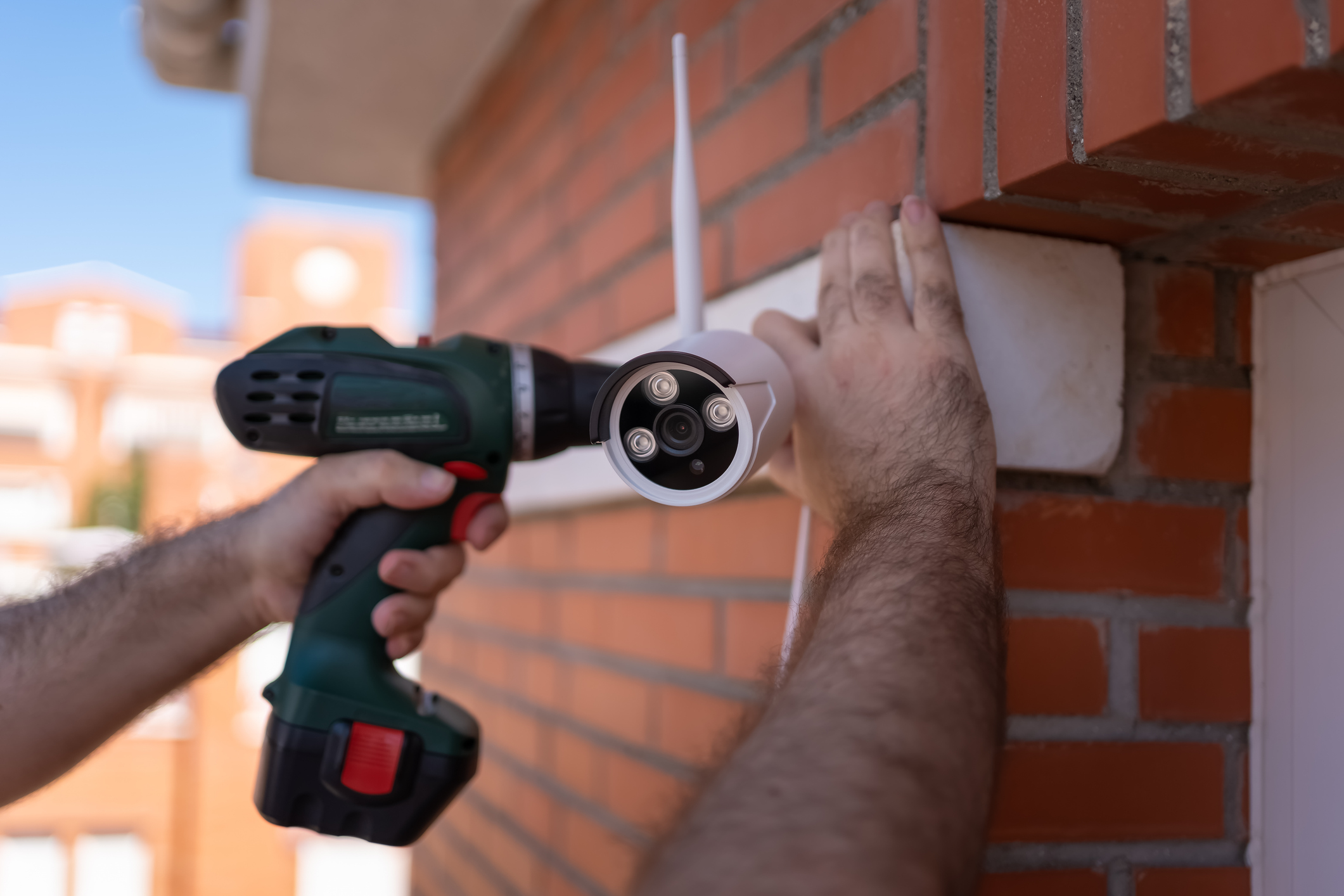
DIY smart home security systems like Ring, SimpliSafe and Wyze offer affordable home security packages. You can choose from packages including security cameras, motion sensors and alarms.
For example, the Ring Alarm Wireless Security System includes a base station, keypad, door/window contact sensor, motion detector and range extender to help you get started. You can add on more devices over time, which can help minimize the initial costs of your security system.
These systems tend to be easy to install yourself, and you can customize them to your security goals. For example, you might decide to add on smart smoke detectors and carbon monoxide alarms. If the alarms are triggered, your monitoring system will contact your local fire department, even if you’re not home at the time of the fire.
Security systems can be smart investments in your home’s safety. According to a study funded by the Alarm Industry Research and Education Foundation, 60% of burglars would look for an alternative target if they saw an alarm system, and most burglars look for an alarm before attempting a burglary.
Additionally, some insurers offer discounts for monitored systems or even unmonitored smart home security systems. So be sure to ask your home insurance provider if there are discounts available.
2. Deadbolts and reinforced door hardware
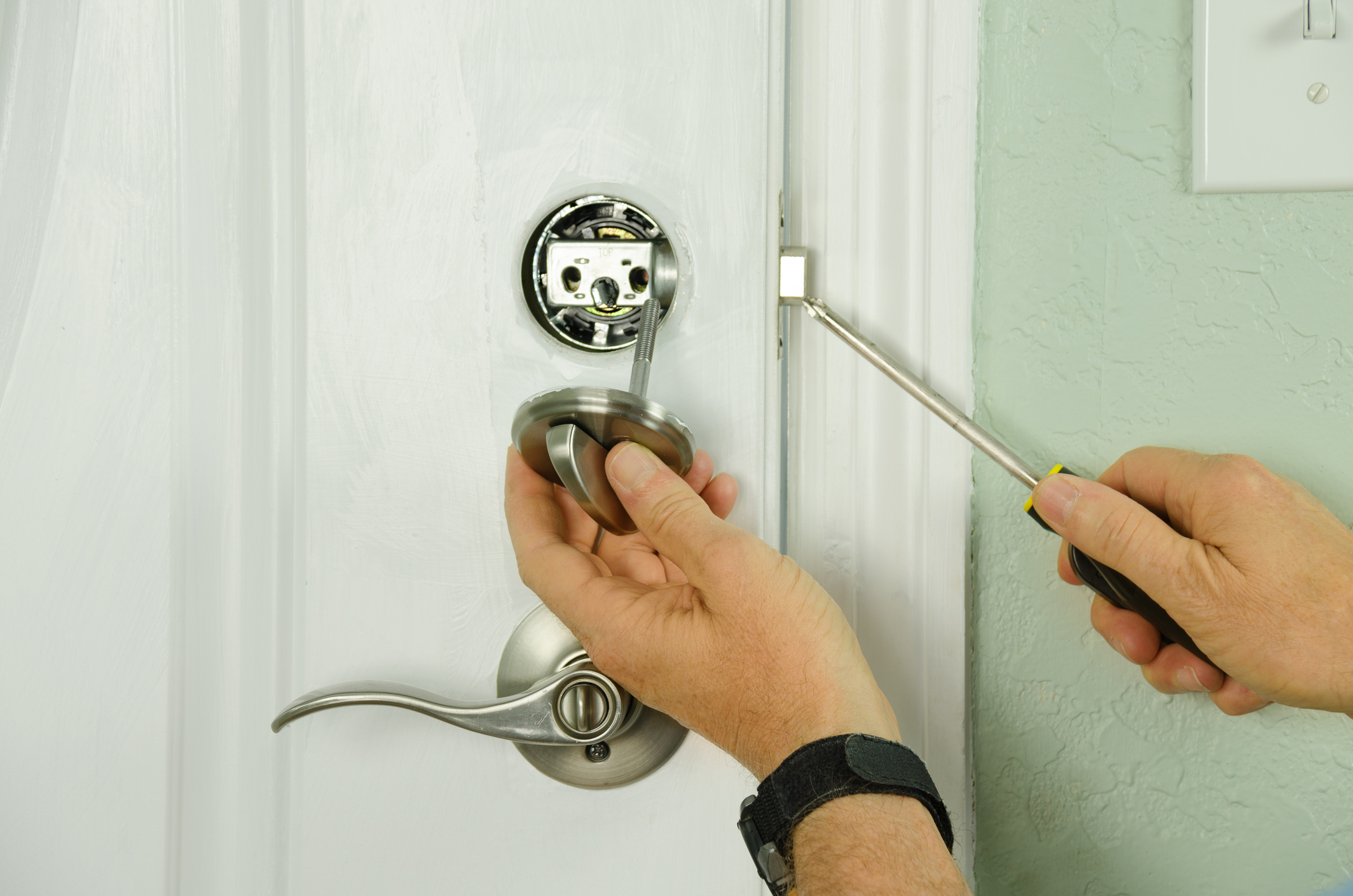
The deadbolt that’s currently on your door might not do the best job of protecting your home, so consider reinforcing it with a Grade 1 deadbolt.
The American National Standards Institute developed a system to rate deadbolt quality. Grade 1 deadbolts offer the highest quality, most reliable security based on factors like their strength and the quality of materials used.
Upgrading your deadbolt can help prevent a burglar from being able to kick in your door. In addition to investing in a Grade 1 deadbolt, reinforce your door frame with a steel strike plate.
Use long screws that go at least one inch into the door frame stud to maximize the resistance of the strike plate, making your door more difficult to kick in. These affordable upgrades can have a big impact on your home’s security.
3. Motion-sensor lights and smart bulbs
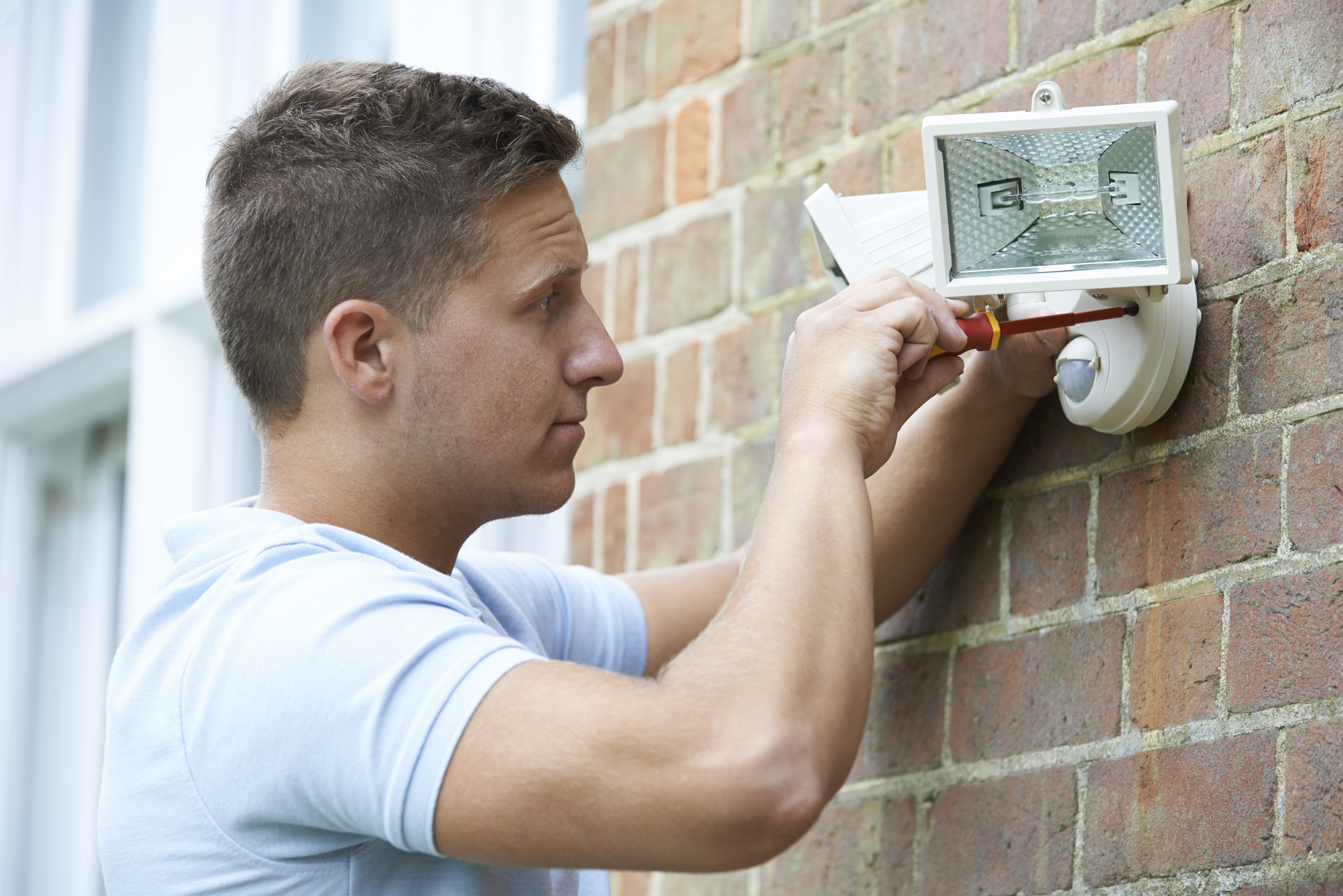
Outdoor motion-sensor lights can deter break-ins and improve the visibility around your home. Since the lights only turn on when activated, they can help save you money on your electrical bill while improving your home’s security.
You can install many motion-sensor lights in place of an outdoor flood light, but you’ll need some electrical knowledge since the lights will have to be wired in.
Solar motion-sensor lights, like the Bell + Howell Bionic Spotlight Solar Powered Motion Sensor Flood Light, are much simpler to install and can be easily relocated around your home and yard as needed.
4. Security window film
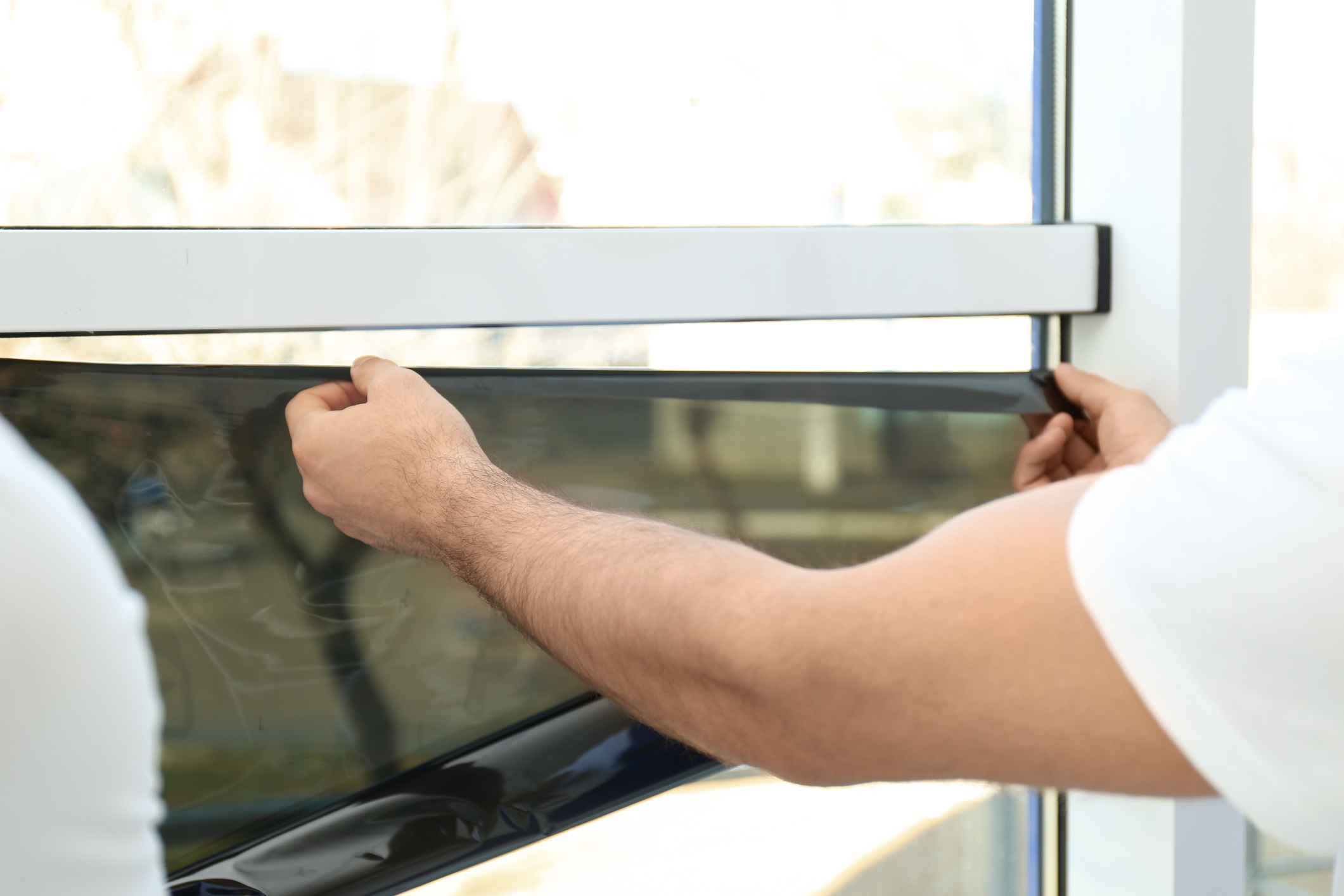
Security window film helps strengthen your glass windows, absorbing impacts from a break-in attempt and helping to prevent the window from shattering.
Some window films also darken your windows to prevent burglars from being able to easily see into your home.
Window film is easy to install and can be left in place for years. It may help to slow or deter break-ins, and can also help minimize storm damage.
5. Video doorbells
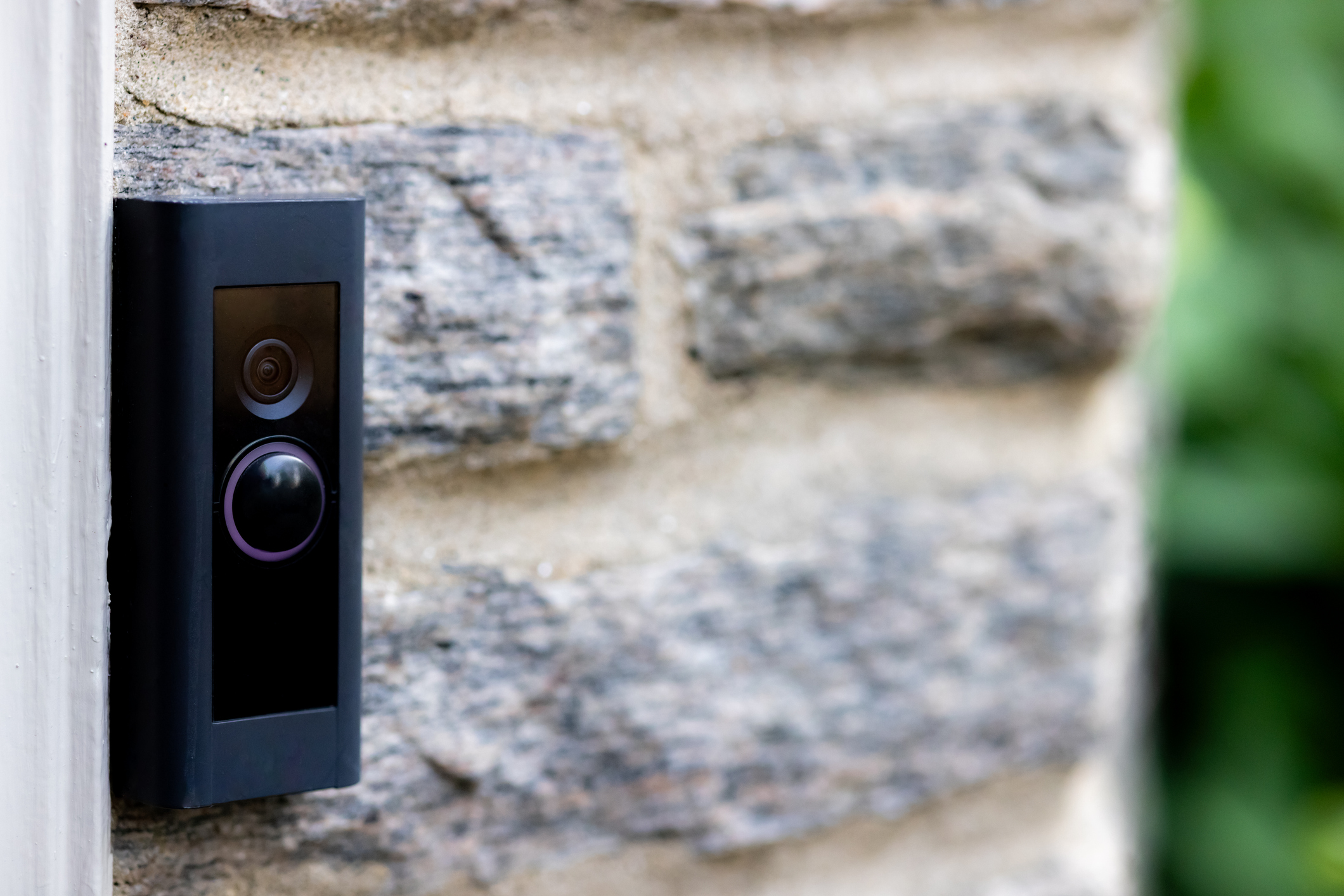
Video doorbells are affordable and easy to install, and many can pair with your smart security system.
While some doorbells are designed to be hardwired, there are plenty of battery-powered options, like the Ring Battery Doorbell Plus, that make for an easy DIY installation.
If you’re renting your home, look for a no-drill video doorbell mount that’s easy to install and just as easy to remove when it’s time to move out.
With a video doorbell, you can answer your door and speak with visitors even when you aren’t home. The doorbells also capture and store video footage that you can use as evidence in case you need to file a home insurance claim. These doorbells offer peace of mind and are a great investment in your home’s security.
Additional ways to lower your home insurance premiums
If you're looking to lower your home insurance premiums, start by calling your insurance provider. Ask whether the home security device you’re considering qualifies for a discount, and take the opportunity to explore other potential savings.
You might be eligible for discounts by bundling your home and auto policies, enrolling in paperless billing, or making home improvements like installing a new roof.
Make it a habit to review your home insurance coverage annually to ensure it still fits your needs — and that you're getting all the discounts you qualify for.
If you're considering bigger home improvement projects, that could qualify for bigger discounts. And with interest rates falling, now's a great time to tap your home equity to get those projects funded.
Use your tool below, powered by Bankrate, to see what kind of home equity rates you can get right now:
Related content
Profit and prosper with the best of Kiplinger's advice on investing, taxes, retirement, personal finance and much more. Delivered daily. Enter your email in the box and click Sign Me Up.

Paige Cerulli is a freelance journalist and content writer with more than 15 years of experience. She specializes in personal finance, health, and commerce content. Paige majored in English and music performance at Westfield State University and has received numerous awards for her creative nonfiction. Her work has appeared in The U.S. News & World Report, USA Today, GOBankingRates, Top Ten Reviews, TIME Stamped Shopping and more. In her spare time, Paige enjoys horseback riding, photography and playing the flute. Connect with her on LinkedIn.
-
 Quiz: Do You Know How to Avoid the "Medigap Trap?"
Quiz: Do You Know How to Avoid the "Medigap Trap?"Quiz Test your basic knowledge of the "Medigap Trap" in our quick quiz.
-
 5 Top Tax-Efficient Mutual Funds for Smarter Investing
5 Top Tax-Efficient Mutual Funds for Smarter InvestingMutual funds are many things, but "tax-friendly" usually isn't one of them. These are the exceptions.
-
 AI Sparks Existential Crisis for Software Stocks
AI Sparks Existential Crisis for Software StocksThe Kiplinger Letter Fears that SaaS subscription software could be rendered obsolete by artificial intelligence make investors jittery.
-
 We Retired at 62 With $6.1 Million. My Wife Wants to Make Large Donations, but I Want to Travel and Buy a Lake House.
We Retired at 62 With $6.1 Million. My Wife Wants to Make Large Donations, but I Want to Travel and Buy a Lake House.We are 62 and finally retired after decades of hard work. I see the lakehouse as an investment in our happiness.
-
 I'm an Opportunity Zone Pro: This Is How to Deliver Roth-Like Tax-Free Growth (Without Contribution Limits)
I'm an Opportunity Zone Pro: This Is How to Deliver Roth-Like Tax-Free Growth (Without Contribution Limits)Investors who combine Roth IRAs, the gold standard of tax-free savings, with qualified opportunity funds could enjoy decades of tax-free growth.
-
 One of the Most Powerful Wealth-Building Moves a Woman Can Make: A Midcareer Pivot
One of the Most Powerful Wealth-Building Moves a Woman Can Make: A Midcareer PivotIf it feels like you can't sustain what you're doing for the next 20 years, it's time for an honest look at what's draining you and what energizes you.
-
 I'm a Wealth Adviser Obsessed With Mahjong: Here Are 8 Ways It Can Teach Us How to Manage Our Money
I'm a Wealth Adviser Obsessed With Mahjong: Here Are 8 Ways It Can Teach Us How to Manage Our MoneyThis increasingly popular Chinese game can teach us not only how to help manage our money but also how important it is to connect with other people.
-
 Looking for a Financial Book That Won't Put Your Young Adult to Sleep? This One Makes 'Cents'
Looking for a Financial Book That Won't Put Your Young Adult to Sleep? This One Makes 'Cents'"Wealth Your Way" by Cosmo DeStefano offers a highly accessible guide for young adults and their parents on building wealth through simple, consistent habits.
-
 I'm a Real Estate Investing Pro: This Is How to Use 1031 Exchanges to Scale Up Your Real Estate Empire
I'm a Real Estate Investing Pro: This Is How to Use 1031 Exchanges to Scale Up Your Real Estate EmpireSmall rental properties can be excellent investments, but you can use 1031 exchanges to transition to commercial real estate for bigger wealth-building.
-
 My Spouse and I Are Saving Money for a Down Payment on a House. Which Savings Account is the Best Way to Reach Our Goal?
My Spouse and I Are Saving Money for a Down Payment on a House. Which Savings Account is the Best Way to Reach Our Goal?Learn how timing matters when it comes to choosing the right account.
-
 We're 78 and Want to Use Our 2026 RMD to Treat Our Kids and Grandkids to a Vacation. How Should We Approach This?
We're 78 and Want to Use Our 2026 RMD to Treat Our Kids and Grandkids to a Vacation. How Should We Approach This?An extended family vacation can be a fun and bonding experience if planned well. Here are tips from travel experts.